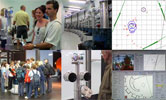Current Projects |
 |
SPENCER (EU FP7-ICT-2011-2.1) SPENCER breaks new ground for cognitive systems in populated environments. While the state of the art is still limited in the ability to perceive, model and learn human social behavior and respond with appropriate actions in real-time from mobile platforms, SPENCER will systematically address these problems in a multidisciplinary team. We will advance the fields of perception of individuals and groups in sensory data, normative human behavior learning and modeling, socially-aware mapping, and socially-aware task, motion and interaction planning under real-world conditions. I am the coordinator of the project.
|
|
|
SFB/TR8 - Spatial Cognition The DFG-funded interdisciplinary Transregional Collaborative Research Center "Spatial Cognition: Reasoning, Action, Interaction" is running since January 2003 at the Universities Bremen and Freiburg, Germany. The Center is concerned with the acquisition, organization, utilization and revision of knowledge about spatial environments, be it real or abstract, human or machine. The goal of the SFB/TR 8 is to investigate the cognitive foundations for human-centered spatial assistance systems. I am Principle Investigator (PI) of the project N1-SocialSpace for which I was awarded a DFG Junior Research Group Leader Grant.
|
||
|
Nurobot Automation and Artefacts GmbH Nurobot Automation and Artefact GmbH has two domains of activity, industrial
navigation systems and services around the cultural aspects of robotics. A spin-off
company from EPFL, the foundation was motivated by the successful application of research results
in navigation and the realization of various interdisciplinary projects. Today the company is
able to offer cutting-edge AGV navigation technology. Clients include
LogObject AG, MRS Automation, EURON, MfK Bern, and others. |
Former Projects (selection) |
 |
ICRA 2009 Workshop on "People Detection and Tracking" As robots enter more domains in which they interact and cooperate closely with humans, the capacity of machines to detect and track humans is becoming a key technology for many areas in robotics. This workshop, which I chaired together with Oscar Martinez-Mozos, brings together key researchers in people detection and tracking with an emphasis to unite members of the vision community and the community that has mostly worked with range finders. The goal is to provide a representative survey of the state of the art and to transfer knowledge within and across the communities.
|
|
 |
INDIGO (EU FP6-ICT): Interaction with Personality and Dialogue Enabled Robots The goal of INDIGO, an EC-funded STREP project, is to develop technology that will facilitate the advancement of human-robot interaction. This will be achieved both by enabling robots to perceive natural human behaviour as well as by making them act in ways that are familiar to humans. As post-doctoral research associate at the Autonomous Intelligent Systems Lab, I was work package and task responsibile.
|
|
|
DESIRE (BMBF): The German Service Robotics Initiative The DESIRE project aims at integrating leading edge technology in the field of service robotics and to develop an open, extensible system architecture. The project is funded by the German ministery of research (BMBF) and includes major names in the German robotics community. I was task leader and involved in people detection and tracking, situation analysis, and system integration.
|
||
 |
2000-people survey on acceptance of robots
There is great optimism that a new generation of robots, robotic prostheses and implantable devices will widely pervade our daily life in a near future. In collaboration with the Institute of Anthropology and Sociology of the University of Lausanne, the survey questioned over 2000 subjects whether "we want to share our life and body with robots". The results testify a positive attitude towards potential robotic co-workers, flat-mates or body part, but include also a number of surprising answers. |
|
 |
The CAS Robot Navigation Toolbox
The CAS Robot Navigation Toolbox is a GNU GPL licensed Matlab toolbox for robot localization and mapping. It was made for research and education and contains a number of features that decouple the algorithmic implementation from the feature representation, the sensors used and the data import modules. The toolbox takes advantage of Matlab's object orientation capabilities and runs in nearly real time for smaller experiments. The project is part of the Wallenberg Global Learning Network (WGLN). |
|
 |
Expo.02 "Robotics" Exhibition The "Robotics" pavilion at the Swiss National Exhibition Expo.02 is still the
biggest deployment of autonomous robots in a public space. Eleven freely navigating robots have been interacting with almost 700,000 visitors during a five months period,
seven days a week, twelve hours per day. The robots' tasks were tour guiding, picture taking of visitors and entertainment. My responsibilities included project co-management, steering committee membership, and main responsible for robot navigation (team of 5 people). I further was the intermediate person for scientific and artistic contents between the EPFL team and scenographers, exhibition makers, architects and industrial designers. |
|
 |
IROS 2002 Workshop on "Robots in Exhibitions" Exhibition and museums have emerged as a new application domain of autonomous robots.
This workshop, organized together with Wolfram Burgard, focused on robots deployed in a public,
exhibition-like space with high degrees of autonomy and interactivity. It brought together robotics
researchers and end-users from various backgrounds to discuss recent developments, state-of-the-art
and visions for the future. |
|
  |
Constructon of robot Pygmalion Pygmalion is a mobile research platform. The challenge included mechanical, electrical,
and low-level software design. Pygmalion (Piggy) has a compact and decent appearance and sports
a VME-based six-axis controller and the RTOS XO/2. The robot is equipped with tactile sensors, laserscanners, a monocular
camera, speech output and a number of standard I/O-options. The robot operated successfully for several
years at the Autonomous Systems Lab, EPFL |